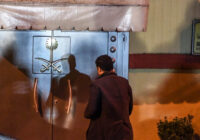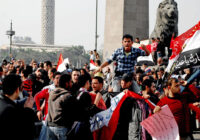Qatar’s influence in Syria and its recent presentation of a flawed peace initiative for the Arab-Israeli conflict, highlights the fact that the state has deviated from its former welcomed role as a regional firefighter.
Belatedly, the gas-rich state of Qatar has been assuming a geopolitical role and interventionist policy in the Middle East and the North Africa, one befitting of a superpower, thanks to the tiny Gulf emirate’s disproportionate wealth and largess.
Regional Firefighter
For a while, Qatar, with a population of only a few hundred thousand Qatari nationals, appeared to play the constructive role of a firefighter, sponsoring mediation initiatives to quell local strife and conflicts among vying militant factions in certain hot spots of the Arab world; Darfur being a case in point. The same can be said of Qatar’s generous funds for the redevelopment of southern Lebanon in the aftermath of the Israeli-Hezbollah War of 2006 — celebrated in great fanfare during a visit to the region by the Qatari emir for the inauguration of the reconstructed infrastructure.
Qatari money and largess, at the time, were positive developments that welcomed and enhanced the tiny Gulf emirate’s prestige and status vis-à-vis the Arab people. The state’s soft-power and status were further elevated with the successes of the Qatari-owned Al-Jazeera in reaching millions of Arab viewers and presenting, for the first time in the Arab annals, a nongovernment-controlled version of the news and sophisticated TV programs airing across the Middle East and North Africa.
Involvement in Syria
Somehow — and this is where the anomaly of getting caught in a spell of the arrogance of power — Qatar’s strong involvement in the destructive Syrian Civil War is threatening the security and stability of the Levant. Today, Qatar's influence is going against what originally started as the welcomed role of a firefighter and an agent for socioeconomic development in the region.
The stale, brutal, and corrupt political system in Syria — as true of many countries touched by the winds of the Arab Spring — needs total revamping. The country needs the introduction of a democratic system, an accountable government, transparency, and the end of rampant corruption.
However, genuine and local civil protests, which found expression in peaceful demonstrations and civil disobedience that took place at the start of the Syrian crisis, should not have developed into the current armed conflict that now appears to be serving ulterior external political agendas. These agendas are not necessarily in the long-term interest of Syria or the Syrian people. The application of disproportionate brutal force, the heavy-hand of the state, arrogance of power, and shortsightedness of the ruling Syrian regime, along with the Syrian uprising which has developed into an endless armed conflict, has rendered the Syrian situation susceptible to all kinds of foreign intervention. The plan of external powers for a long time was to undermine the defense capabilities of the country due to the Syrian regime’s rejectionist posture vis-à-vis western-sponsored peace initiatives.
Qatar, in part because of a weak and malleable secretary-general of the Arab League, succeeded in taking the Syrian crisis outside the appropriate confines of the Arab world and placing it into the realm of the United Nations and western powers, who tended to internationalize the Syrian conflict and gave room for external players to advance their agendas. Qatar’s overt funding of NATO’s assault on Libya appeared to normalize what would have formerly been regarded as a breach of the joint Arab Defense Pact, observed by members of the Arab League for many decades. By reaching this internationalization of the Syrian crisis, Qatar abandoned its former positive role as a regional firefighter and a constructive agent of stabilization and socioeconomic development.
The escalating armed struggle in Syria is inviting the monster of dormant sectarian tensions, whose tentacles are reaching beyond the Syrian boundaries to the Middle East at large. The stirring of sectarian tensions cannot be completely dismissed as a calculated factor which was consciously deployed at the start of the conflict by the Syrian regime. However, several foreign countries backing the Syrian opposition also used sectarianism as a strategy to render the Syrian crisis open-ended: as a grinding civil war with no decisive outcome in sight.
Flawed Peace Initiative
The recent Qatari proposal to sponsor a further truncated peace initiative in the Arab-Israeli conflict – reducing the Palestinian cause and Israeli apartheid into an issue of a land swap – which was rejected by the Palestinian movements, including Hamas, Islamic Jihad, and the Popular Front for the Liberation of Palestine, is reflective of a bankrupt Arab polity. This is especially the case as the new Qatari approach is a watered down version of the Arab Peace Initiative that was already insufficient and below the Palestinians’ expectations for a just peace. The apparent single-handed Qatari peace plan is a reflection of an exaggerated sense of importance by the Qataris. It also demonstrates a significantly diminished status of the Arab League by virtue of a weak secretary-general, and the total absence of a truly representative body of Palestinians to decide and veto the uncalled-for initiative by the Qatari Government.
It is high times that Qatar takes a back seat. With the absence of a decisive military outcome to the current conflict in Syria, calls for neutral Arab intermediaries will become louder. Algeria, Egypt and Sudan — individually or in unison — can step in to play this intermediary role. This could be carried out within the framework of the Arab League, thus restoring the credibility of the organization and leading to an early peaceful resolution to the Syrian crisis.
Qatar has caused immeasurable damage with regards to the Syrian Civil War, and has dealt a potential setback to a truly genuine peace effort in the Middle East by trying to cut corners. Its bold initiatives cannot be justified by the country’s small size. The stage now seems set for a more neutral and credible Arab intermediary to step in and put an end to what is becoming a senseless and all-destructive war in Syria, whose flames threaten to spread into the wider Levant.
The views expressed in this article are the author's own and do not necessarily reflect Fair Observer’s editorial policy.
Image: Copyright © Shutterstock. All Rights Reserved
Support Fair Observer
We rely on your support for our independence, diversity and quality.
For more than 10 years, Fair Observer has been free, fair and independent. No billionaire owns us, no advertisers control us. We are a reader-supported nonprofit. Unlike many other publications, we keep our content free for readers regardless of where they live or whether they can afford to pay. We have no paywalls and no ads.
In the post-truth era of fake news, echo chambers and filter bubbles, we publish a plurality of perspectives from around the world. Anyone can publish with us, but everyone goes through a rigorous editorial process. So, you get fact-checked, well-reasoned content instead of noise.
We publish 2,500+ voices from 90+ countries. We also conduct education and training programs
on subjects ranging from digital media and journalism to writing and critical thinking. This
doesn’t come cheap. Servers, editors, trainers and web developers cost
money.
Please consider supporting us on a regular basis as a recurring donor or a
sustaining member.
Will you support FO’s journalism?
We rely on your support for our independence, diversity and quality.







Comment